-
 bitcoin
bitcoin $87959.907984 USD
1.34% -
 ethereum
ethereum $2920.497338 USD
3.04% -
 tether
tether $0.999775 USD
0.00% -
 xrp
xrp $2.237324 USD
8.12% -
 bnb
bnb $860.243768 USD
0.90% -
 solana
solana $138.089498 USD
5.43% -
 usd-coin
usd-coin $0.999807 USD
0.01% -
 tron
tron $0.272801 USD
-1.53% -
 dogecoin
dogecoin $0.150904 USD
2.96% -
 cardano
cardano $0.421635 USD
1.97% -
 hyperliquid
hyperliquid $32.152445 USD
2.23% -
 bitcoin-cash
bitcoin-cash $533.301069 USD
-1.94% -
 chainlink
chainlink $12.953417 USD
2.68% -
 unus-sed-leo
unus-sed-leo $9.535951 USD
0.73% -
 zcash
zcash $521.483386 USD
-2.87%
What is the OTC transaction process of USDT?
OTC USDT trading offers privacy and larger trade sizes than exchanges, but requires finding a counterparty, negotiating price and payment (bank transfers, P2P), and prioritizing security & regulatory compliance to mitigate risks.
Mar 14, 2025 at 06:30 pm
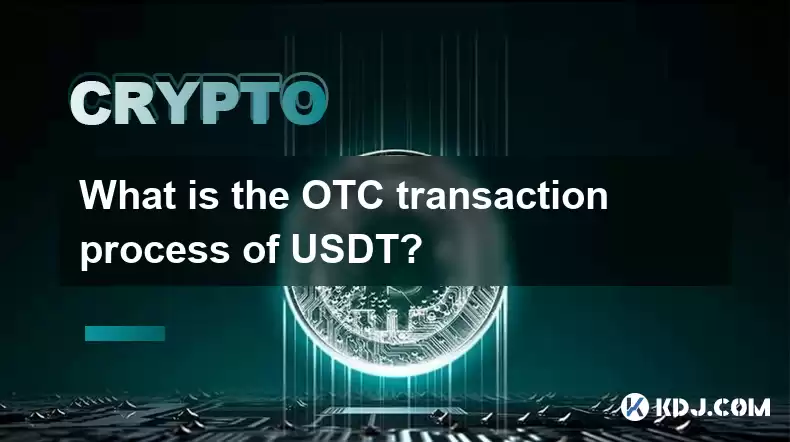
- OTC (Over-the-Counter) USDT transactions occur outside of centralized exchanges, offering greater privacy and potentially larger trade sizes.
- The process typically involves finding a counterparty (a buyer or seller), negotiating a price, and completing the transaction off-exchange.
- Payment methods vary widely, ranging from bank transfers to peer-to-peer payment platforms.
- Security and trust are paramount concerns, requiring careful vetting of counterparties and secure transaction methods.
- Regulatory compliance and potential risks associated with illicit activities must be considered.
USDT, a prominent stablecoin pegged to the US dollar, offers a unique trading avenue through Over-the-Counter (OTC) transactions. Unlike exchange-based trading, OTC deals happen directly between two parties without the intermediary of a centralized exchange. This method provides advantages such as increased privacy and the ability to handle larger trade volumes that might exceed exchange limits. However, it also introduces complexities and potential risks.
Finding a Counterparty:The first step involves locating a willing buyer or seller of USDT. This can be achieved through various channels, including dedicated OTC trading desks, online forums, or peer-to-peer (P2P) marketplaces specializing in cryptocurrency trading. Establishing trust and verifying the counterparty's legitimacy is crucial at this stage. Reputable OTC desks often have a robust verification process, while P2P platforms usually feature user ratings and reviews.
Negotiating the Price and Trade Details:Once a counterparty is identified, the next step is price negotiation. The price will fluctuate based on market demand, liquidity, and the size of the transaction. Factors like the payment method and the speed of the transaction can also influence the final price. Both parties must agree on a mutually acceptable price and the quantity of USDT to be traded. Specific details, such as payment deadlines and any associated fees, should also be clearly defined.
Choosing a Payment Method:Payment methods for OTC USDT transactions are diverse. Popular options include bank wire transfers, which are often preferred for larger transactions due to their speed and reliability. Other methods include peer-to-peer payment platforms like PayPal or Alipay, although these might involve higher fees or longer processing times. Cryptocurrency wallets are another option, allowing for direct transfer of USDT or other cryptocurrencies. The chosen method must be secure and aligned with the agreed-upon terms.
Completing the Transaction:The transaction itself typically involves a series of steps to ensure both parties fulfill their obligations. This might involve sending payment first and receiving USDT in return, or vice versa, depending on the trust level established between the parties and the agreed-upon terms. Using escrow services can mitigate risks for both buyer and seller, providing a secure intermediary to hold funds until both sides complete their part of the agreement.
Security Considerations:Security is paramount throughout the OTC USDT transaction process. Thorough due diligence is essential to avoid scams and fraudulent activities. Verifying the identity of the counterparty, using secure communication channels, and employing secure payment methods are critical steps to protect against potential losses. Always prioritize established and reputable OTC desks or P2P platforms with strong security measures.
Regulatory Compliance:OTC USDT transactions, like all cryptocurrency activities, are subject to varying regulatory frameworks across different jurisdictions. Understanding and adhering to relevant regulations is crucial to avoid legal issues. This includes reporting requirements, anti-money laundering (AML) compliance, and Know Your Customer (KYC) procedures, which might be enforced by the counterparty or required by law.
Risks and Potential Issues:While OTC USDT trading offers advantages, it also carries inherent risks. These include the potential for scams, counterparty risk (the risk of the other party failing to fulfill their obligations), and the risk of dealing with illicit activities. Careful selection of counterparties, thorough due diligence, and the use of secure transaction methods are crucial to mitigate these risks.
Frequently Asked Questions:Q: Is OTC USDT trading legal? A: The legality of OTC USDT trading varies depending on the jurisdiction. Some regions have clear regulations governing cryptocurrency transactions, while others are still developing their regulatory frameworks. It's crucial to research the applicable laws in your location.
Q: How do I find a reputable OTC USDT trader? A: Research and due diligence are key. Look for established OTC desks with a proven track record and positive reviews. P2P platforms often have user rating systems, providing insight into the reliability of other users. Never rush into a transaction without verifying the counterparty's legitimacy.
Q: What are the fees involved in OTC USDT transactions? A: Fees vary depending on the chosen payment method, the platform used (if any), and the size of the transaction. Bank wire transfers might have relatively low fees, while P2P platforms often charge transaction fees or percentages. OTC desks also typically charge fees for their services.
Q: Is OTC USDT trading safer than exchange trading? A: This isn't a straightforward yes or no. While OTC trading can offer greater privacy, it also carries higher risks due to the lack of a centralized exchange's regulatory oversight and security measures. The safety of either method depends heavily on the user's diligence and the chosen counterparty.
Q: Can I use OTC to buy large amounts of USDT? A: Yes, OTC trading is often preferred for large transactions that might exceed the limits of centralized exchanges. However, finding a counterparty willing to handle such a large volume might require more time and effort.
Q: What happens if the counterparty doesn't fulfill their obligation in an OTC USDT transaction? A: This highlights the importance of thorough due diligence and using escrow services. If a dispute arises, legal recourse might be necessary, depending on the jurisdiction and the terms of the agreement. This underscores the need for clear communication and documentation throughout the transaction.
Disclaimer:info@kdj.com
The information provided is not trading advice. kdj.com does not assume any responsibility for any investments made based on the information provided in this article. Cryptocurrencies are highly volatile and it is highly recommended that you invest with caution after thorough research!
If you believe that the content used on this website infringes your copyright, please contact us immediately (info@kdj.com) and we will delete it promptly.
- Work Dogs Unleashes TGE Launch, Sets Sights on Mid-2026 Listing & Ambitious $25 Token Target
- 2026-01-31 15:50:02
- WD Coin's TGE Launch Ignites Excitement: A Billion Tokens Set to Hit the Market
- 2026-01-31 16:10:02
- Royal Mint Launches Interactive £5 Coin for a Thrilling Code-Breaker Challenge
- 2026-01-31 16:10:02
- Crypto, AI, and Gains: Navigating the Next Wave of Digital Assets
- 2026-01-31 15:50:02
- Coin Nerds Forges Trust in the Digital Asset Trading Platform Landscape Amidst Evolving Market
- 2026-01-31 16:05:01
- Blockchains, Crypto Tokens, Launching: Enterprise Solutions & Real Utility Steal the Spotlight
- 2026-01-31 12:30:02
Related knowledge
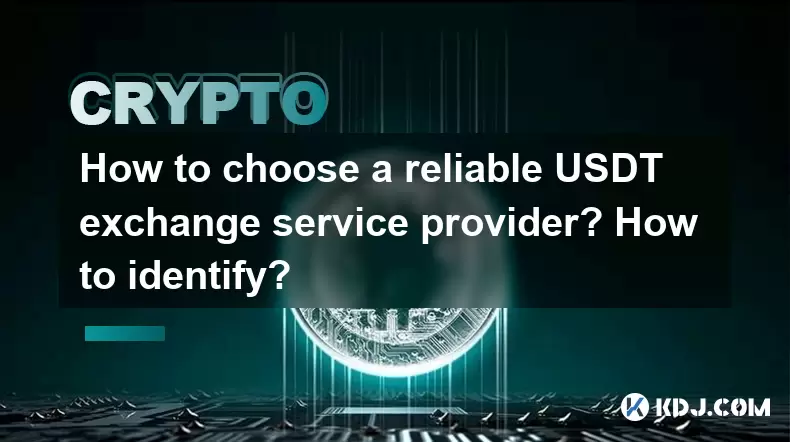
How to choose a reliable USDT exchange service provider? How to identify?
Jun 12,2025 at 03:15pm
Understanding the Role of USDT in Cryptocurrency TradingUSDT (Tether) is one of the most widely used stablecoins in the cryptocurrency market. It is d...
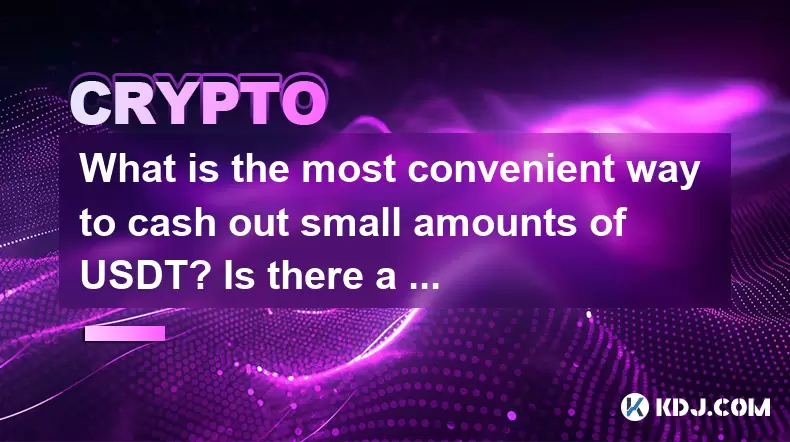
What is the most convenient way to cash out small amounts of USDT? Is there a shortcut?
Jun 11,2025 at 11:00pm
Understanding the Need to Cash Out Small USDT AmountsCashing out small amounts of USDT can be a challenge for many crypto users. Traditional methods o...
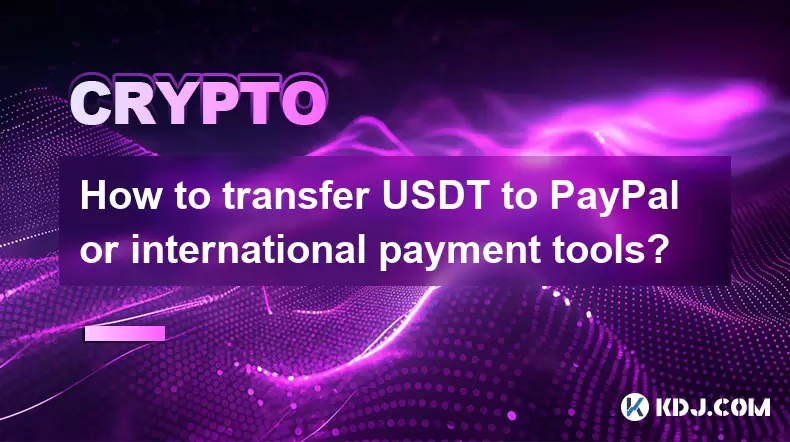
How to transfer USDT to PayPal or international payment tools?
Jun 15,2025 at 05:28am
Understanding the Basics of USDT and PayPal IntegrationUSDT (Tether) is a stablecoin pegged to the US dollar, offering blockchain-based value transfer...
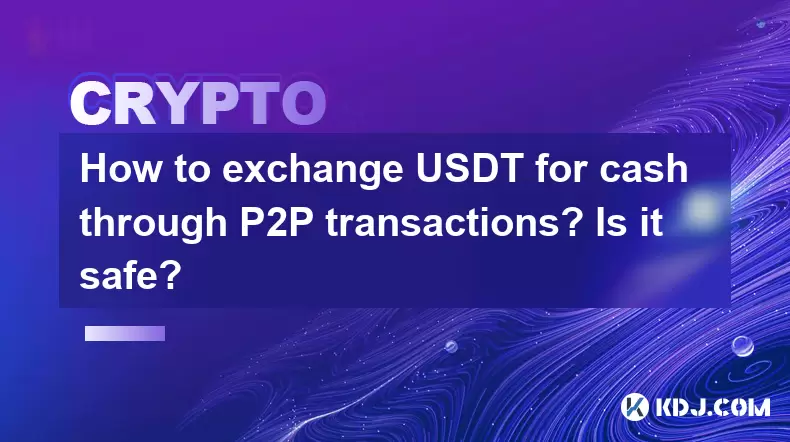
How to exchange USDT for cash through P2P transactions? Is it safe?
Jun 18,2025 at 07:56am
Understanding USDT and P2P TransactionsTether (USDT) is a stablecoin pegged to the value of the US dollar, making it a popular choice for users who wa...
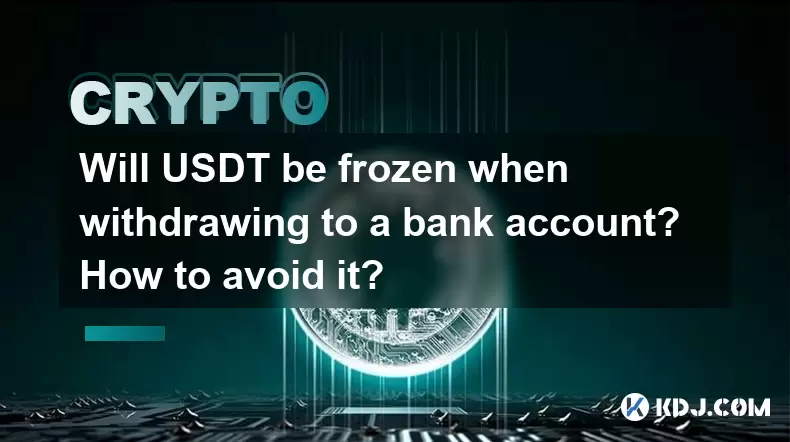
Will USDT be frozen when withdrawing to a bank account? How to avoid it?
Jun 15,2025 at 10:03am
Understanding USDT Withdrawals and Bank Account Freezing RisksWhen users decide to withdraw USDT (Tether) to a bank account, one of the most common co...
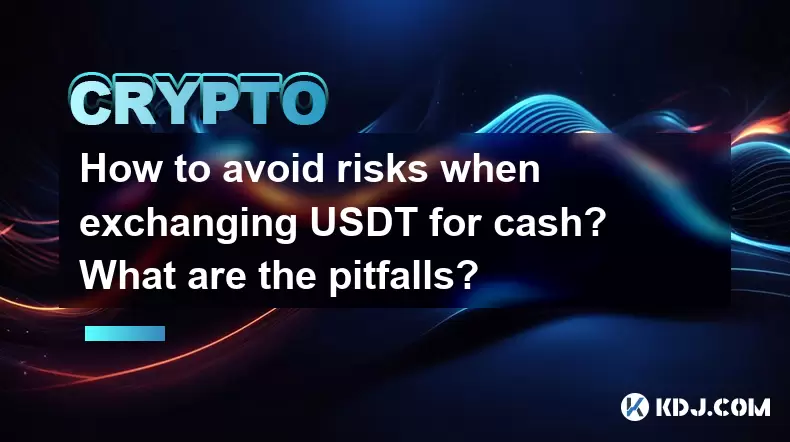
How to avoid risks when exchanging USDT for cash? What are the pitfalls?
Jun 11,2025 at 08:14pm
Understanding the Risks of Exchanging USDT for CashWhen exchanging USDT (Tether) for cash, users must be aware of the potential risks involved. As a s...

How to choose a reliable USDT exchange service provider? How to identify?
Jun 12,2025 at 03:15pm
Understanding the Role of USDT in Cryptocurrency TradingUSDT (Tether) is one of the most widely used stablecoins in the cryptocurrency market. It is d...

What is the most convenient way to cash out small amounts of USDT? Is there a shortcut?
Jun 11,2025 at 11:00pm
Understanding the Need to Cash Out Small USDT AmountsCashing out small amounts of USDT can be a challenge for many crypto users. Traditional methods o...

How to transfer USDT to PayPal or international payment tools?
Jun 15,2025 at 05:28am
Understanding the Basics of USDT and PayPal IntegrationUSDT (Tether) is a stablecoin pegged to the US dollar, offering blockchain-based value transfer...

How to exchange USDT for cash through P2P transactions? Is it safe?
Jun 18,2025 at 07:56am
Understanding USDT and P2P TransactionsTether (USDT) is a stablecoin pegged to the value of the US dollar, making it a popular choice for users who wa...

Will USDT be frozen when withdrawing to a bank account? How to avoid it?
Jun 15,2025 at 10:03am
Understanding USDT Withdrawals and Bank Account Freezing RisksWhen users decide to withdraw USDT (Tether) to a bank account, one of the most common co...

How to avoid risks when exchanging USDT for cash? What are the pitfalls?
Jun 11,2025 at 08:14pm
Understanding the Risks of Exchanging USDT for CashWhen exchanging USDT (Tether) for cash, users must be aware of the potential risks involved. As a s...
See all articles





















![Ultra Paracosm by IlIRuLaSIlI [3 coin] | Easy demon | Geometry dash Ultra Paracosm by IlIRuLaSIlI [3 coin] | Easy demon | Geometry dash](/uploads/2026/01/31/cryptocurrencies-news/videos/origin_697d592372464_image_500_375.webp)




















































